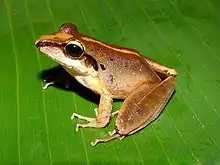Craugastoridae
Craugastoridae, commonly known as fleshbelly frogs, is a family of New World direct-developing frogs. As delineated here, following the Amphibian Species of the World, it contains 129 species. They are found from the southern United States southwards to Central and South America.[1]
| Craugastoridae | |
|---|---|
 | |
| Craugastor longirostris | |
| Scientific classification | |
| Domain: | Eukaryota |
| Kingdom: | Animalia |
| Phylum: | Chordata |
| Class: | Amphibia |
| Order: | Anura |
| Superfamily: | Brachycephaloidea |
| Family: | Craugastoridae Hedges, Duellman, and Heinicke, 2008 |
| Genera | |
|
See text | |
Taxonomy
The taxon was created by Stephen Blair Hedges, William Edward Duellman and Matthew P. Heinicke in 2008.[2] The taxonomy of these frogs is not yet settled,[3][4] and other sources may treat the subfamily Strabomantinae as a family, Strabomantidae,[4][5][6] with correspondingly smaller Craugastoridae.[4][7][8] The family was rearranged in 2014,[9] and more recently in 2021.[10]
Life history
With the possible exception of Craugastor laticeps that may be ovoviviparous,[11] craugastorid frogs have direct development: no free-living tadpole stage is known; instead, eggs develop directly into small froglets.[2]
Genera
Two genera are recognised in the family Craugastoridae:[1]
- Craugastor Cope, 1862 (126 species)
- Haddadus Hedges, Duellman, and Heinicke, 2008 (three species)
Taxa formerly in Craugastoridae
The following two taxa were formerly placed in Craugastoridae, but are now incerta sedis within the superfamily Brachycephaloidea, awaiting more data to resolve their position:[9]
- Atopophrynus Lynch and Ruiz-Carranza, 1982 (monotypic)[12]
- Geobatrachus Ruthven, 1915 (monotypic)[13]
References
- Frost, Darrel R. (2008). "Craugastoridae Hedges, Duellman, and Heinicke". Amphibian Species of the World, an Online Reference. Version 6.0. American Museum of Natural History, New York. Retrieved 13 February 2022.
- Hedges, S. B.; Duellman, W. E. & Heinicke, M. P (2008). "New World direct-developing frogs (Anura: Terrarana): Molecular phylogeny, classification, biogeography, and conservation" (PDF). Zootaxa. 1737: 1–182. doi:10.11646/zootaxa.1737.1.1.
- Frost, Darrel R. (2014). "Higher taxonomy and progress". Amphibian Species of the World: an Online Reference. Version 6.0. American Museum of Natural History. Retrieved 25 April 2014.
- Blackburn, D.C. & Wake, D.B. (2011). "Class Amphibia Gray, 1825. In: Zhang, Z.-Q. (Ed.) Animal biodiversity: An outline of higher-level classification and survey of taxonomic richness" (PDF). Zootaxa. 3148: 39–55. doi:10.11646/zootaxa.3148.1.8.
- "Strabomantidae Hedges, Duellman and Heinicke, 2008". Integrated Taxonomic Information System.
- "Strabomantidae". AmphibiaWeb: Information on amphibian biology and conservation. [web application]. Berkeley, California: AmphibiaWeb. 2014. Retrieved 25 April 2014.
- "Craugastoridae Hedges, Duellman and Heinicke, 2008". Integrated Taxonomic Information System.
- "Craugastoridae". AmphibiaWeb: Information on amphibian biology and conservation. [web application]. Berkeley, California: AmphibiaWeb. 2014. Retrieved 25 April 2014.
- Padial, J. M.; Grant, T. & Frost, D. R. (2014). "Molecular systematics of terraranas (Anura: Brachycephaloidea) with an assessment of the effects of alignment and optimality criteria". Zootaxa. 3825: 1–132. doi:10.11646/zootaxa.3825.1.1. PMID 24989881.
- Motta, A. P.; P. P. G. Taucce; C. F. B. Haddad; C. Canedo (2021). "A new terraranan genus from the Brazilian Atlantic Forest with comments on the systematics of Brachycephaloidea (Amphibia: Anura)". Journal of Zoological Systematics and Evolutionary Research. 59 (3): 663–679. doi:10.1111/jzs.12452. S2CID 234058664. Retrieved 13 February 2022.
- McCranie, J.R.; M.H. Wake & L. Valdés Orellana (2013). "Craugastor laticeps. Possible ovoviviparity". Herpetological Review. 44 (4): 653–654.
- Frost, Darrel R. (2015). "Atopophrynus Lynch and Ruiz-Carranza, 1982". Amphibian Species of the World: an Online Reference. Version 6.0. American Museum of Natural History. Retrieved 7 June 2015.
- Frost, Darrel R. (2015). "Geobatrachus Ruthven, 1915". Amphibian Species of the World: an Online Reference. Version 6.0. American Museum of Natural History. Retrieved 7 June 2015.